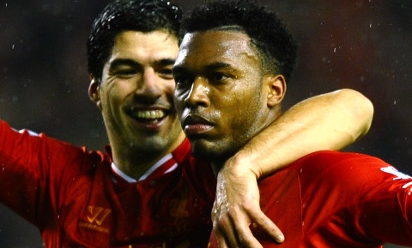'Other sports can learn from Liverpool'
Such was the speed, control and precision at the foundation of Liverpool's handsome Merseyside derby victory earlier this week, that one leading figure in rugby union watching on learned new lessons.
Brendan Rodgers' Reds were unstoppable when Everton crossed Stanley Park on Tuesday evening, swarming their opponents from the first moment until the last with high intensity pressing from every player.
Once they had retrieved possession, the ball was either carried forward or released directly to a teammate, denying the visitors the chance to regroup sufficiently and taking advantage of the subsequent freedom.
The football world was suitably impressed, but the performance appears to have struck a chord beyond the sport - with former England rugby union coach, Sir Clive Woodward, arguing that Liverpool's tactics could be adapted for another code.
Writing in his Daily Mail column before the beginning of the Six Nations tournament, the 58-year-old said: "England can learn a lesson from how Liverpool play. They are in dazzling form because of the speed and accuracy with which they move the ball.
"The high-quality, high-tempo Merseyside derby rammed home a simple lesson about elite sport: the hardest thing to defend against is speed.
"What struck me watching that compelling spectacle was the pace of play from both teams, zipping the ball around with such skill and control.
"The same principle is true in rugby: if you attack at a blistering pace, use the full width of the pitch and offer a degree of unpredictability in what you do, you can beat anyone.
"For flat-out pace there are faster players than Luis Suarez and Daniel Sturridge in the Premier League, but there is nobody quicker at shifting the ball into space. The whole team had clearly totally understood this system."
The 2003 World Cup winner's comments were put to Reds boss Rodgers at his pre-match press conference on Friday, with the Northern Irishman welcoming a 'compliment to the players'.
Woodward also revealed how the Liverpool manager had previously sought a discussion regarding practices and philosophies that could be transferred across sports - football and rugby, for example.
He added: "After the 2003 World Cup, Liverpool manager Brendan Rodgers came to visit me. He wanted to talk about coaching, to discuss ideas that would lend themselves across sports.
"We talked about organisation, the art of possession, movement patterns, fluidity and positioning of the team. We both shared the philosophy that we would rather lose a game trying to win than lose trying not to be beaten."



